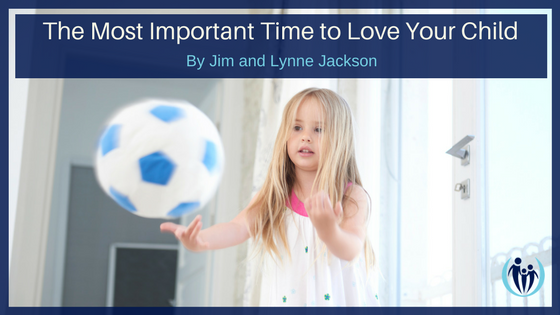
The Most Important Time to Love Your Child
What might happen if every time we disciplined our children we remembered this powerful message of God's love for us: "See what great love the Father has lavished on us, that we should be called children of God!" (1 John 3:1).
What might happen if every time we disciplined our children we remembered this powerful message of God’s love for us: “See what great love the Father has lavished on us, that we should be called children of God!” (1 John 3:1). God’s love is a free gift. No strings attached. No behavioral outcomes needed. If God loves us so freely, let’s receive that love, and give it away to our kids. Even when they misbehave.
We have repeatedly found that when parents can make their love known, even in the worst of behavior challenges, it almost always softens the intensity of their children’s defiance. And more importantly, it communicates to children that they are loved no matter what, whether they behave well or poorly.
It’s hard to do this, because we get caught in the heat of the moment. But what if…?
“Love No Matter What” Can Change Everything
Early in our ministry, we met a mom named Melanie who had “angry mom” written all over her, most notably by her permanent scowl. She wasted no time in telling us about her daughter’s misbehaviors and listened skeptically to our encouragement to make sure her discipline flowed from a heart of unconditional love.
The following week, Melanie’s young daughter, Anna, disobeyed by playing with a soccer ball in the living room. In a flash, Melanie’s prized possession, an antique heirloom lamp, was shattered. Upon hearing the crash Melanie raced into the room to find her precious lamp exploded all over the floor. That was her instinct, too — to explode all over her daughter.
As Melanie started into her familiar rage, she noticed how fearful her daughter was, cowering on the floor, awaiting her mom’s wrath. She felt an unfamiliar twinge of compassion. She knew this was an opportunity to demonstrate God’s unconditional love, if only she could let go of her rage. Melanie took a deep breath. She uttered a quick prayer and for the first time in her life in a discipline situation she felt God’s Spirit move in her. She remembered the message of the class: “Love her now. Because this is when it matters.” She dropped to her knees, gathered a terrified Anna into her arms, and from her newly-found heart of compassion said, “That lamp was really special to me, but I love you so much more than that lamp!” Relief poured out in Anna’s deep sobs. For the first time in the midst of messing up, Anna felt loved as Melanie held and rocked her. Problem-solving about the broken lamp could wait.
Seven years later we ran into Melanie again, but this time she was vibrant and joyful. “That was absolutely a turning point in my life,” she said. “I realized I didn’t have to be the stern and harsh parent my parents were.”
Like Melanie, we can break the pattern of angry punishment. When we let go of our rage, or even just our frustration, we can better prepare our hearts. Then we can focus on communicating unconditional love to our children even when they struggle, and we open the way for both us and our children to experience the wonderful cascade of God’s love and mercy.
This is not to say that we should skip consequences — Melanie talked with her daughter later, and imposed appropriate consequences for disobediently playing with her soccer ball in the house. The point is that we should administer consequences while keeping the love message alive.
Love Wins: The Eternal Impact
If we only express love when our children behave well or need comfort, we communicate to them that love is conditional. Our kids may learn to perform to get love, and that can be a very unhealthy life pattern.
But when parents express love when their children struggle or misbehave, they effectively communicate that their kids are so valuable that they are loved in spite of what they do. Expressing love and kindness during these challenging times is the only way to truly convince our children that they are loved unconditionally, no matter what they do. This is the best way to open the door of the children’s hearts to our teaching.
Not only is communicating unconditional love important for connecting in discipline, but it also paves the way for children to truly understand God’s love for them. When we show our kids that “neither tantrums, nor defiance…nor any other misbehavior” can separate them from our love, we help them understand that nothing can separate them from the love of God, either (Romans 8:38-39).
If we want our children to seek God’s love and truth, we would do well to consider an important question: How do I want my child to view God when she messes up?
For it is in our discipline that we have the greatest opportunity to show them that our love — and God’s — is “wide, deep, and long” enough to cover them even when they misbehave.
Frustrated by constant discipline challenges? Take 15 minutes to read our free ebook 4 Messages All Children Long to Hear: A Discipline That Connects Overview.

